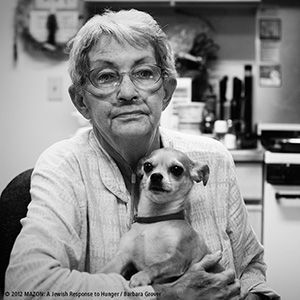
The most recent data charting senior hunger are shocking: in America today, an astounding 15.5 percent of seniors risk not getting the sustenance they require. That’s nearly 10 million people who may not know where their next meal is coming from. The trend in the statistics is even more appalling: from 2007 to 2013, the number of seniors whose health and well-being are seriously threatened because of the risk of hunger exploded, rising by 56 percent.
At MAZON: A Jewish Response To Hunger, we are working hard to slow – and hopefully eliminate – these rates. Along with dozens of other organizations, such as Feeding America, we are determined to address senior hunger effectively and efficiently. Through our Solutions to Senior Hunger Initiative, we have learned several key strategies that can make a significant difference in the lives of seniors in need.
- Take It To The Streets: While senior hunger is a national threat, its solution rises from the grassroots up. Determining who and where food-insecure seniors are is by definition a communal action – nobody knows more about who needs help than friends and neighbors. Grassroots community awareness and action are essential.
- Market, Market, Market: As many as 60 percent of seniors who are eligible to receive nutritional support through the Supplemental Nutrition Assistance Program (SNAP, previously known as food stamps) do not apply for it. Some seniors do not apply out of a sense of shame or failure, but a huge number don’t apply because they simply do not know they are eligible in the first place. An aggressive community marketing effort – outreach to senior enclaves, public service announcements, news releases, speaking engagements, media appearances – educates seniors in need, as well as their families, friends and neighbors on the help that is readily available.
- Advocate: We can solve senior hunger, but to do so we must address the local government practices and procedures that create barriers to senior assistance, such as cumbersome or slow application processes, poor communication, and misdirected resources. And rather than go it alone, we will exponentially improve our chances of success by actively seeking opportunities to collaborate with others. The first phase of MAZON’s Solutions to Senior Hunger Initiative included communities as diverse as rural Pennsylvania and metropolitan Denver, but the agencies in those disparate communities quickly discovered they have much to learn from one another and that coordination and sharing ultimately benefitted them all.
Confronted with a reality as harsh – and as embarrassing – as the crisis of senior hunger in America, there is no question that we must act. We have an obligation to seniors in need, which demands that our actions achieve maximum results. We must explore and adapt and advocate until we achieve the change we seek – a country where senior hunger ceases to exist. Together, we will transform how it is into how it should be.
